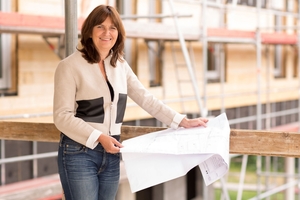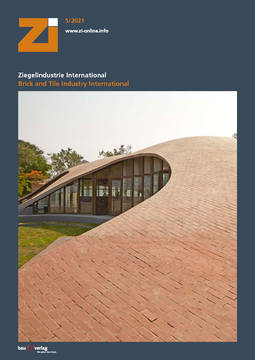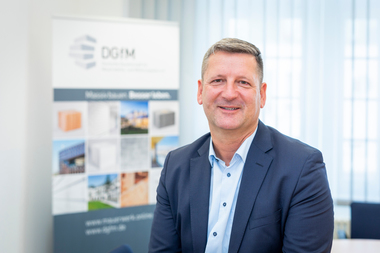Mechthild Heil as its prominent guest
The Deutsche Gesellschaft für Mauerwerks- und Wohnungsbau (DGfM – German Masonry and Housing Construction Association) invited Mechthild Heil, chairwoman of the German parliament’s Committee on Building, Housing, Urban Development and Local Government as a guest to its digital general meeting. Despite the parliamentary summer recess, the most senior construction policymaker in the German parliament, the Bundestag, took time to answer questions on important future topics tabled by representatives of the masonry industry. Dr Hannes Zapf, chairman of the DGfM Board, expressed his thanks on behalf of all those taking part for the frank discussion and her interest in the concerns of the masonry sector.
Local government must get on board
First item was climate neutrality of the energy-intensive industry. With roadmaps that point the way to CO2-neutral production, companies have set the course to achieve the 2045 climate goals. So that these goals can be met, the next German government must ensure that renewable energies and green hydrogen are available in sufficient quantities and with the necessary infrastructure. Cooperation between Germany’s Federal Government, state governments and local governments had to be improved considerably with regard to upgrading the infrastructure, Mechthild Heil said plainly.
Creating objectifiable facts
With regard to sustainability, Dr Zapf stressed that masonry-built buildings with a lifetime of more than 100 years, the lowest CO2 emissions over the entire building lifecycle and a recycling rate of over 90 percent are already much more sustainable than timber buildings today, something which policymakers did not seem to appreciate. To make the sustainability of masonry more objectifiable, Heil, who is herself a member of parliament for Ahrweiler and therefore from a quarrying region, advised a comprehensive comparative study by an independent institute. Moreover, the graduate architect encouraged the masonry industry to make more funding requests for research into a climate-neutral future with mineral-based building materials. The corresponding funds were available, she said.
Making the impossible possible
Another topic that concerns the manufacturers of masonry bricks is securing the future supply of raw materials. In the meantime, the designation of new extraction areas takes up to 15 years. The reason for this are besides protracted administration decisions often objections by residents and natural conservation associations through all judicial instances. Dr Hans Georg Leuck, Honorary Chairman of the DGfM, suggested a considerable acceleration of such processes and limit these to fewer judicial instances. Corona had shown how important it was to produce system-relevant products on your own doorstep. The masonry industry was still able to supply products, with no unpredictable price surges.






